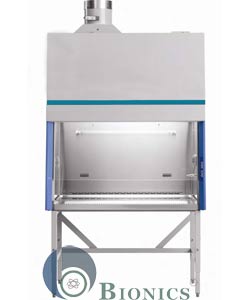Yes, Good Class 2 Biosafety Cabinets Do Exist
Yes, Good Class 2 Biosafety Cabinets Do Exist
Blog Article
Class 2 Biosafety Cabinets – Vital for Lab Safety and Biological Containment

Modern laboratories prioritise safety for workers, materials, and environments. Whether it's conducting biological tests, diagnostics, or experiments with infectious agents, biosafety cabinets play an integral role in contamination prevention and sample integrity.
Class 2 Biosafety Cabinets are widely adopted for offering three-way protection. These units are crucial for working with moderate-risk organisms and sensitive samples.
Understanding Biosafety Cabinets
Biosafety cabinets are airflow-controlled workspaces engineered for microbiological safety. They use HEPA filtration to remove contaminants from incoming and outgoing air.
These units are generally classified into Classes I, II, and III depending on airflow and application needs. Among these, Class 2 cabinets are the most versatile and commonly used.
Defining Class 2 Biosafety Cabinets and Their Role
Class 2 Biosafety Cabinets ensure safety on all fronts—personnel, workspace, and biological material. They direct filtered airflow in a laminar pattern over the work surface.
Both incoming and outgoing air are HEPA-filtered to maintain sterility and prevent leaks. These cabinets are frequently used in labs handling infectious agents or clinical samples.
Essential Features of Class 2 Safety Cabinets
A Class 2 microbiological safety cabinet includes several critical technologies such as:
• HEPA/ULPA filtration to trap microbes and particles
• Uniform downward airflow to protect the sample zone
• Inward airflow to keep aerosols contained
• Built-in UV sterilisation for decontaminating surfaces
• Noise-reducing construction for better working conditions
• Clear front panel for visibility and safety
These elements ensure safety, comfort, and efficiency in day-to-day lab tasks.
Where Class 2 Cabinets Are Used
Class 2 Biosafety Cabinets are key equipment in healthcare, molecular biology, and quality control. They are critical for DNA/RNA extraction, pathogen culture, and molecular microbiological safety cabinet assays.
Hospitals, research labs, and manufacturing units depend on these cabinets for contamination control.
Why Laboratories Prefer Class II Safety Cabinets
Using Class 2 cabinets offers significant improvements in contamination control and user safety:
• Prevents contamination during sensitive procedures
• Prevents accidental exposure to infectious materials
• Improves environmental safety by filtering outgoing air
These cabinets combine safety features with operational efficiency.
Regulatory Standards for Class 2 Cabinets
Top manufacturers ensure their cabinets meet certifications like NSF 49, EN 12469, and WHO recommendations. Class 2 units are sub-classified as A1, A2, B1, and B2—based on varying airflow balance and ducting needs.
• Type A2: Ideal for general-purpose labs
• Type B2: Used for hazardous vapors and chemicals
Selecting the right configuration ensures compliance and safety.
Choosing the Right Biosafety Cabinet
Before purchasing, consider:
• Your application type (e.g., diagnostics, pharma, research)
• Ventilation compatibility and placement
• Ease of use, energy efficiency, and upkeep
• Manufacturer reputation and post-sale support
Working with reliable manufacturers provides peace of mind and technical guidance.
Installation and Safety Guidelines
For optimal results:
• Install the cabinet in a draft-free, low-traffic zone
• Ensure annual certification and airflow testing
• Train users in proper techniques and precautions
Operational best practices include:
• Use gloves, gowns, and face shields while operating
• Work calmly to prevent airflow disturbances
• Wipe work areas with disinfectants regularly
• Treat UV usage as an overnight sterilisation method
Conclusion
Class 2 biosafety cabinets are vital equipment in laboratories dealing with biohazards. They protect workers, secure samples, and copyright environmental standards.
From pathology labs to advanced genetic testing, Class II cabinets support world-class laboratory practices. When investing in a biosafety cabinet, prioritise compliance, usability, and long-term support—because your research deserves the best protection. Report this page